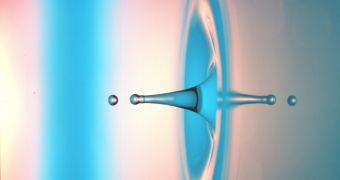Plastic is everywhere around us, and nowadays we almost drink from nothing else than plastic containers. It's so fancy to carry with you a plastic bottle and drink your water / juice / soda little by little.
But while US bottled water sales are going up by an annual 9.7 %, on a market estimated at approximately $11 billion, amassing at the same pace mountains of tossed plastics, alarm calls are made for people to go back to drinking tap water. "This country has some of the best public water supplies in the world. Instead of consuming four billion gallons (15 billion liters) of water a year in individual-sized bottles, we need to start thinking about what all those bottles are doing to the planet's health.", signaled the New York Times.
An American consumes 400 liters (106 gallons) of water daily from many sources, compared to 10 individual liters (2.6 gallons) in developing countries.
Bottled water in the US does not mean necessarily mineral water, and you can pay a high price just to drink tap water! At the end of July, PepsiCo had to recognize that its Aquafina is just ... tap water! This "is an important first step. Concerns about the bottled water industry, and increasing corporate control of water, are growing across the country," said Gigi Kellett, director of the "Think Outside the Bottle" campaign.
Whether mineral or just tap, bottled water never comes cheap. The New York Times signaled that some can pay $ 1,400 annually, while the same amount of water consumed from home faucet can cost less than 50 cents, while the quality may not exceed that of the tap water. "Bottled water sold in the United States is not necessarily cleaner or safer than most tap water, according to a four-year scientific study," has reported the National Resources Defense Council.
Another issue: just in the US, 1.5 million barrels of oil are required yearly for the plastic bottles. Add the fuel consumed with the transport, as premium water can come from France, Italy and even the Fiji Islands, and you have quite a clear picture on the environmental impact.
Many politicians support the anti-bottled water campaign: employees of the city hall of San Francisco now have to drink what comes out of the faucet, as the major stopped plastic-bottled water supply. New York has launched a campaign to convince its inhabitants to drink water from public sources.
Bottled water producers launched a defense initiative last week, claiming that bottled water is a healthy choice instead of calorie-heavy sweet sodas. "If the debate is about the impact of plastic packaging on the environment, a narrow focus on bottled water spotlights only a small portion of the packaged beverage category and an even smaller sliver of the universe of packaged products. Any efforts to reduce the resources necessary to produce and distribute packaged goods -- and increase recycling rates -- must focus on all packaging," said Joseph Doss, president of International Bottled Water Association.
Here they were caught with their pants down: a panel of 38 researchers have recently showed that Bisphenol A, a main ingredient in bottle plastics, is causing reproductive disorders in people.
The team reviewed 700 researches just to reach the conclusion that people are regularly exposed to bisphenol A (BPA) levels which are much higher than those found to harm lab animals. Newborn mice exposed to BPA experienced uterine damage, connected in women to reproductive diseases and cancers. BPA could imitate the natural female sex hormone, estradiol.
Humans can be directly exposed to BPA through food or drink (read water) that has been in contact with plastics. "There is essentially no difference in the way that rat or mouse cells respond to BPA and the way that humans respond to it. Though the amount in humans may seem like an incredibly small amount, it causes effects in human cells at the part-per-trillion level," said Frederick vorn Saal University of Missouri-Columbia reproductive toxicologist.
"BPA caused reproductive tract damage similar to the anti-miscarriage drug DES (diethylstilbestrol), a synthetic estrogen that was prescribed to pregnant women from the 1940s until the late 1970s. The drug led to "DES daughters", who were born with reproductive defects that caused infertility and cancers." said Retha Newbold, of the National Institute of Environmental Health Sciences.

 14 DAY TRIAL //
14 DAY TRIAL //